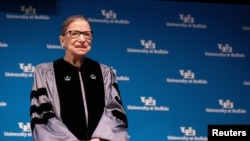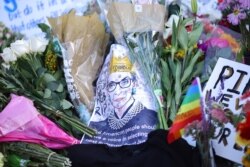The pancreatic cancer that claimed Supreme Court Justice Ruth Bader Ginsburg on Friday at the age of 87 was the final chapter in a long battle with the disease.
Her final year on the bench was punctuated with medical issues, but she publicly remained upbeat and optimistic through a series of infections, a fall that broke several ribs and the recurrence of cancer. As recently as July she said she was "encouraged by the success of my current treatment."
Ginsburg was first diagnosed with colon cancer in 1999 and underwent surgery, radiation and chemotherapy.
No further signs of cancer appeared until 2009, when doctors discovered a 1-centimeter lesion on her pancreas during a routine checkup. That lump turned out to be benign, but another, smaller tumor was discovered during surgery. That one was cancerous, but it was early-stage and had not yet spread.
Pancreatic cancer is the fourth-most fatal form of the disease in the United States, accounting for about 7% of deaths and about 3% of cases, according to the American Cancer Society. Localized pancreatic cancer has a five-year survival rate of 37%.
Ginsburg went on to beat the odds. Her 2009 surgery was considered successful. She underwent a course of chemotherapy she described as "precautionary" and said it would not affect her work on the bench.
In November 2018, Ginsburg fell in her office and broke three ribs. Follow-up tests turned up two malignant nodules in her left lung. A surgeon removed the lower lobe of the lung. Scans done before the surgery found no further signs of cancer.
Blood tests the following July found signs that the pancreatic malignancy had returned. She received radiation therapy in August and a stent was inserted into her bile duct as part of the treatment. No other signs of cancer were found.
"She canceled her annual summer visit to Santa Fe, but has otherwise maintained an active schedule," a statement from the Court said.
This January she told CNN, "I'm cancer free. That's good."
Hospital trips earlier this year had raised concerns, but Ginsberg said they were unrelated. In May doctors removed a gallstone, and on July 14 an infection blocking the bile duct stent was cleaned out.
Three days after the bile duct procedure, she issued a statement with grimmer news. She had been undergoing chemotherapy. The cancer was back.
Doctors had found cancerous lesions on her liver in February, she said. Immunotherapy had failed, but chemotherapy was looking promising.
"My most recent scan on July 7 indicated significant reduction of the liver lesions and no new disease," she said. "I am tolerating chemotherapy well and am encouraged by the success of my current treatment."
She continued working through her treatment.
"I have often said I would remain a member of the Court as long as I can do the job full steam. I remain fully able to do that," she wrote in her July 17 statement in a final burst of optimism before she died Friday.
"We at the Supreme Court have lost a cherished colleague," Chief Justice John Roberts said in a statement. "Today we mourn, but with confidence that future generations will remember Ruth Bader Ginsburg as we knew her -- a tireless and resolute champion of justice.”





